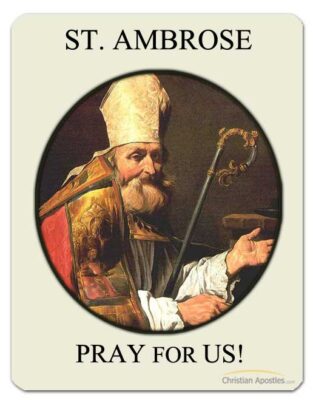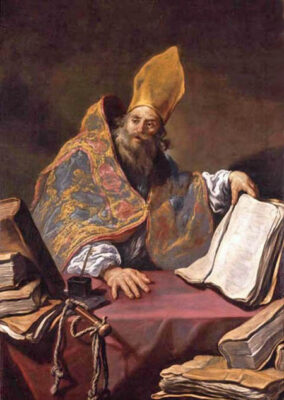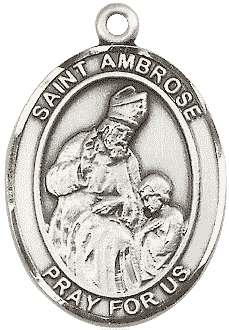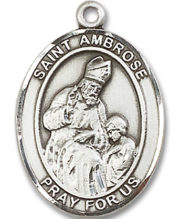Saints
St. Ambrose Medal – Patron of Beekeepers
St. Ambrose Biography
 St. Ambrose is one of the four great Fathers and Doctors of the Western Church. His father was a Prefect of Germany and Italy. He and his wife were Romans and Christians, and their three chidden were raised in Christian surroundings. After the death of the St. Ambrose’ father, his family returned to Rome.
St. Ambrose is one of the four great Fathers and Doctors of the Western Church. His father was a Prefect of Germany and Italy. He and his wife were Romans and Christians, and their three chidden were raised in Christian surroundings. After the death of the St. Ambrose’ father, his family returned to Rome.
St. Ambrose was a bishop of Milan and a Doctor of the Church in the 4th century AD. He is considered one of the most important figures of the Catholic Church in the early Middle Ages, and his influence on Western Christianity has been significant.
He was born around 340 AD in Trier, which is now in Germany, but at that time was part of the Roman Empire. He received a classical education, including the study of rhetoric, and later studied law in Rome.
After returning to Trier, he was appointed as governor of the Roman province of Aemilia-Liguria. However, after the death of the Bishop of Milan, the people of Milan selected Ambrose to be their bishop despite him not being a Christian yet. He was baptized, ordained as a priest, and consecrated as bishop within a week.
As bishop, Ambrose became known for his eloquence, wisdom, and strong leadership. He defended the faith against Arianism, a heresy that denied the divinity of Jesus Christ, and supported the Nicene Creed, which affirmed the full divinity of Jesus Christ. He also helped establish the liturgy and Church music in Milan. Many of his hymns, prayers and sermons are still used in Catholic Church’s liturgy today.
Ambrose wrote extensively, producing sermons, commentaries on scripture, and treatises on various theological and pastoral topics. His writings have been studied for centuries and have had an important impact on the development of Western Christianity. He also played a key role in the conversion of St. Augustine of Hippo, who later became one of the most influential figures in Western Christianity.
Ambrose was known for his political acumen as well. He often served as a mediator between the Emperor and the people, and helped resolve disputes between the Church and the State. He defended the rights of the poor and the Church, and stood up against the imperial government’s attempt to seize Church property.
He also advocated for the rights of the oppressed, and condemned violence against enslaved and persecuted groups. He was a vocal advocate for social justice.
St. Ambrose died on April 4, 397 AD in Milan and was buried in the Basilica of St. Ambrose. He was canonized as a saint by the Catholic Church, and his feast day is celebrated on December 7th. He is one of the four original Doctors of the Church, along with St. Jerome, St. Augustine, and Pope Gregory the Great.
The Life of St. Ambrose
One day little Ambrose seeing his mother and sister kiss the hand of a Bishop, held out his own hand to them to kiss, saying: “”I shall one day be a Bishop””. And yet it was not for a Priest that he was educated, but for public affairs and to follow the career of his father. While quite young he won the favor of Symmachus, prince of the Roman Senate, and of Probus, whom Emperor Valentinian had made the chief Prefect of the Roman empire.
Ambrose had scarcely reached man’s estate when he was made Prefect of Liguria, that is, Governor of Northern Italy. Soon after the new Governor arrived in Milan the whole city was stirred by the death of the Bishop who had governed the Church there for twenty years. The Diocese was torn asunder by rival factions, necessitating the intervention of the Prefect to ensure an orderly election of a successor.
The Great Orator & Bishop
Ambrose went to the scene of disorder and took his place among the orators. As soon as he spoke, the crowd was stilled. He encouraged the people to hold a peaceable election. While he was speaking, and every eye was upon him, a child’s voice was heard calling out, “”Ambrose for Bishop!”” The multitude, moved by the grace of God, took up the cry and demanded: “”Ambrose for Bishop!”” All of his objections were overruled. Convinced that the election was the will of God, he promptly received the Sacraments, was ordained Priest, and consecrated Bishop on December 7, 374.
He then distributed his wealth to the poor: to the Church in Milan he gave his estates reserving only an annuity for his sister Marcellina. Arianism was rampant in his Diocese. A glory seemed to crown the city of Milan as well as the head of Ambrose. He built churches and enriched them with relics, he preached, instructed, and won all hearts by his wonderful eloquence; his Priests ripened into Saints in the sunshine of his zeal; his sermons on the excellence of the religious state inspired many virgins to become spouses of Jesus Christ; while the poor, the imprisoned, widows, orphans and the unfortunate, won his time and attention.
Conversion of St. Augustine
 The entire city of Milan, nobles and people, filled the ranks of processions honor of God and of His Saints. It was during this time of holy prosperity that the famed pagan philosopher Augustine came to Milan. Soon he was seen amongst the crowd who came to listen to the great Archbishop. Day by day Augustine listened; faith fully his mother, St. Monica, prayed for his conversion. Before this two-fold force of prayer and preaching, all the blindness of unbelief vanished until, on Holy Saturday in the year 387, St. Ambrose baptized St. Augustine, the philosopher and poet of Carthage.
The entire city of Milan, nobles and people, filled the ranks of processions honor of God and of His Saints. It was during this time of holy prosperity that the famed pagan philosopher Augustine came to Milan. Soon he was seen amongst the crowd who came to listen to the great Archbishop. Day by day Augustine listened; faith fully his mother, St. Monica, prayed for his conversion. Before this two-fold force of prayer and preaching, all the blindness of unbelief vanished until, on Holy Saturday in the year 387, St. Ambrose baptized St. Augustine, the philosopher and poet of Carthage.
The pen of St. Ambrose was as eloquent as his tongue; his writings are voluminous, and those regarding religious doctrine still are constantly quoted and appealed to as proof of Christian teaching. His courage in reproving and excluding from church services even Emperor Theodosius the Great, who was guilty of the cruel massacre of seven thousand persons of Thessalonica, is one of the most remarkable examples of Christian heroism recorded in history.
St. Ambrose died April 4, 397, being about fifty-seven years old, and having been Bishop twenty-two years and four months. He was buried by the side of the Martyrs SS. Gervase and Protase, whose relics he had enshrined at Milan.
St. Ambrose is the Patron Saint of Beekeepers and Candle-Makers
Today, the Catholic Church designates Saint Ambrose as the patron saint of beekeepers and candle makers. He is often displayed with the icon of a bee, a symbol of great wisdom and education. The Latin phrase for “honey” is “Ambrosia” or the food of the gods, thus the origin of St. Ambrose’s name.
There is even a great legend that once, when St. Ambrose was very young, a swarm of bees swarmed the infant and laid upon his mouth. This was a signal to the world that St. Ambrose was destined to be a great wise orator whose sermons sounded “as sweet as flowing honey”.
Today all orators and beekeepers can turn to St. Ambrose as their patron saint. Many schools and athletic teams that bear the name of Saint Ambrose in fact call themselves the “fighting bees”
Prayers to St. Ambrose
Prayer of intercession as you wear your St. Ambrose Medal
O Lord, who has mercy upon all, take away from me my sins, and mercifully kindle in me the fire of your Holy Spirit. Take away from me the heart of stone: give me a heart of flesh, a heart to love, to adore you, Lord, a heart to delight in you, to follow, to rejoice in you, for the sake of Jesus Christ. Amen.
St. Abrose’s Prayer Before Receiving Communion (Written by St. Ambrose)
O loving Lord Jesus Christ, I a sinner, presuming not on my own merits, but trusting in Thy mercy and goodness, with fear and trembling approach the table of Thy most sacred banquet. For I have defiled both my heart and body with many sins, and have not kept a strict guard over my mind and my tongue.
Wherefore, O gracious God, O awful Majesty, I, a wretched creature, entangled in difficulties, have recourse to Thee the fount of mercy; to Thee do I fly that I may be healed, and take refuge under Thy protection, and I ardently desire to have Him as my Savior, whom I am unable to withstand as my Judge.
To Thee, O Lord, I show my wounds, to Thee I lay bare my shame. I know that my sins are many and great, on account of which I am filled with fear. But I trust in Thy mercy, of which there is no end. Look down upon me, therefore, with the eyes of Thy mercy, O Lord Jesus Christ, eternal King, God and Man, crucified for men.
Hearken unto me, for my hope is in Thee; have mercy on me, who am full of misery and sin, Thou who wilt never cease to let flow the fountain of mercy. Hail, Victim of salvation, offered for me and for all mankind on the tree of the cross. Hail, noble and precious Blood, flowing from the wounds of my crucified Lord Jesus Christ and washing away the sins of the whole world.
Remember, O Lord, Thy creature, whom Thou hast redeemed with Thy Blood. I am grieved because I have sinned, I desire to make amends for what I have done.
Take away from me therefore, O most merciful Father, all my iniquities and sins, that, being purified both in soul and body, I may worthily partake of the holy of holies; and grant that this holy oblation of Thy Body and Blood, of which though unworthy I propose to partake, may be to me the remission of my sins, the perfect cleansing of my offenses, the means of driving away all evil thoughts and of renewing all holy desires, the accomplishment of works pleasing to Thee, as well as the strongest defense for soul and body against the snares of my enemies. Amen.
Popular St. Ambrose Items
A St. Ambrose medal or a St. Ambrose rosary is a perfect gift to give to a young man who has chosen St. Ambrose as their confirmation name. As the patron saint of beekeepers, wearing a St. Ambrose medal daily is a perpetual prayer for Saint Ambrose to intercede on behalf of the wearer. As saints are united closer to God, their prayers are more efficacious, and enriches your own prayer.
Additionally, a Saint Ambrose pendant is a reminder to emulate the example of the holy saint as you garden and live each moment of your life. What a beautiful testament of faith to share with the world, or to keep discretely tucked under your clothes. During the challenging moments of your day, reflect upon the holy life of St. Ambrose and pray for their intercession and protection.
Medals and Pendants
Patron Saints - A's
St. Ambroseis the patron saint of beekepers and students
St. Ambrose is the patron saint of Milan, Italy, and of beekeepers. He is also invoked for the protection of children, students, and those suffering from throat and chest illnesses. He was a bishop of Milan in the 4th century and known for his writings and sermons, as well as his role in the conversion of St. Augustine. He is also known for his role in the theological controversies of the time.
Here is a traditional prayer to St. Ambrose:
“Saint Ambrose, bishop and doctor of the Church, you were known for your wisdom and learning. You converted Saint Augustine to the Faith, and you defended the Church against the Arians. Intercede for me with the Lord, that through your powerful intercession, I may grow in the knowledge and love of God, and that I may be protected in all my needs. Amen.”
Reflection on the feast day of St. Ambrose
The feast day of St. Ambrose is celebrated on December 7th. St. Ambrose, also known as Ambrose of Milan, was a bishop and theologian in the 4th century AD. He is known for his contributions to the development of Western Christianity, and for his role in converting Saint Augustine of Hippo to Christianity.
One of the most notable lessons that we can learn from St. Ambrose is the importance of education and knowledge. St. Ambrose was a well-educated man, and he used his knowledge to spread the word of God. He believed that education was essential for understanding and living out the teachings of Jesus Christ.
St. Ambrose was also known for his leadership and his dedication to the Church. He was a bishop in Milan, and he worked tirelessly to strengthen the Church and to protect the rights of Christians. He was a strong advocate for the poor and the oppressed, and he stood up for the rights of the Church against those who sought to persecute it.
Another important lesson that we can learn from St. Ambrose is the importance of humility. Despite his many accomplishments, St. Ambrose was a humble man who always put the needs of others before his own. He believed that humility was essential for living a virtuous life and for serving God.
As we celebrate the feast day of St. Ambrose, let us remember the lessons that he taught us. Let us strive to be well-educated and knowledgeable, like St. Ambrose, so that we can better understand and live out the teachings of Jesus Christ. Let us also strive to be leaders, like St. Ambrose, who work tirelessly to strengthen the Church and to protect the rights of Christians. And let us strive to be humble, like St. Ambrose, so that we can live virtuous lives and serve God to the best of our abilities.
Discover biographies, prayers, and reflections for more than 400 Catholic Saints
Saints Similar to St. Ambrose
You may also be interested in reading the Biography of St. Augustine and the Biography of St. Jerome and the Biography of St. Monica. St. Ambrose, St. Augustine, St. Jerome, and St. Monica were all influential figures in early Christianity. St. Ambrose was a bishop and theologian, while St. Augustine was a bishop and one of the most important Church Fathers. St. Jerome was a scholar and translator of the Bible, and St. Monica was the mother of St. Augustine. Next up: Biography of St. Amelia
Also check out our handmade St. Ambrose Medal and St. Ambrose Rosary and St. Ambrose Rosary Bracelet.





